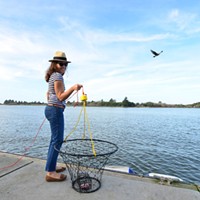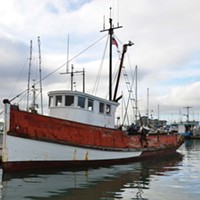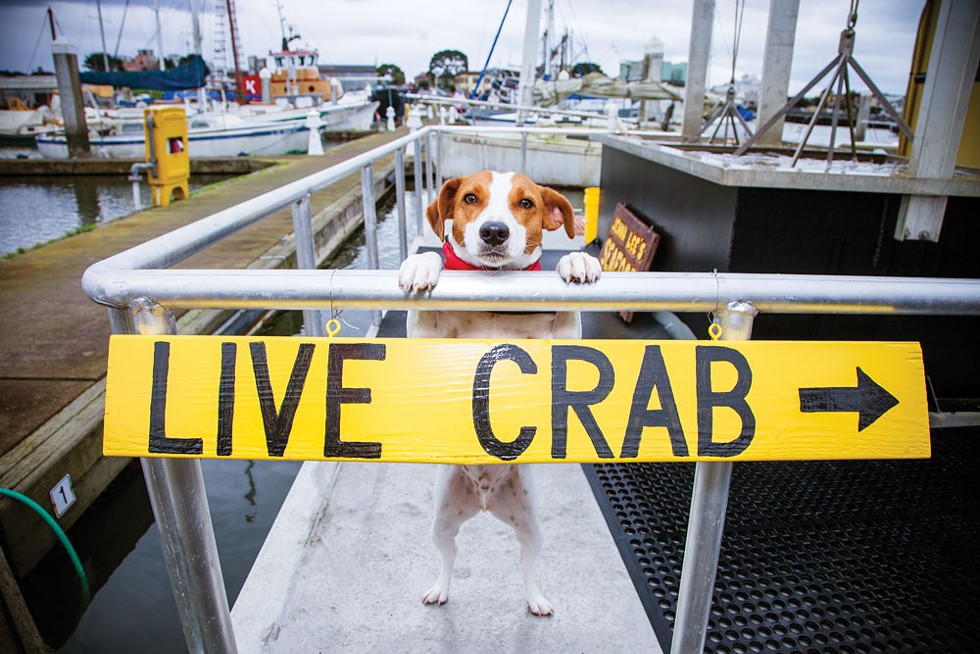In Humboldt County, crab is tradition. A tradition for families gathering around the holiday table, and a tradition for the families whose lives revolve around the harvest season, when the crustaceans are hauled from the cold sea.
It's the morning of opening day and a line has already formed on Dock B at Woodley Island as the first customers of the season gather to buy fresh, live crab right off the boat. Jenna Lee Seafoods has a new look this year. The boat, named after the Pinto family's oldest daughter, was retired after 11 years of service both as a crabbing vessel and seasonal store. The company name remains, as does Jenna Lee Pinto, 24, who strides the deck of the business's new craft in insulated, waterproof waders, her streaked blond hair pulled back in an artfully messy bun. Normally Jenna lives in Chico, but she returns every year to sell crab alongside her mother Carol. Her father, Kevin Pinto, does the actual crabbing aboard his new boat, the Seaila.
"You look scared," says Pinto as she holds out a crab for approval to one of her first customers, a wide-eyed woman from the Midwest. The crab snaps its pinchers and waves its legs menacingly, reaching its claws back towards Jenna Lee's gloved hand. The other hand, which is tipped with bright pink nail polish, demonstrates how to back, crack and pick apart the crustacean once it's been boiled. The woman's eyes grow wider still, but she readily buys two crabs, double bagged in plastic and paper.
"I get pinched about once a year," says Jenna laughing, "and man does it hurt." She has a practiced way of picking up the crabs, grabbing the back of their carapaces with her digits out of reach of the claws. The gloves she wears don't protect against the pain of a crab's occasional angry nip, but are worn to shield her hands from the cold water. The live crabs mill and bob in a tank of constantly circulating water on the boat's deck. The water, pumped from the bay below, keeps the crabs healthy. They're so healthy, in fact, that occasionally one will scramble to the lip of the tank as though to make a break for it. The family's Jack Russell terrier Roscoe watches them with wary interest.
Roscoe, clad in a bright red insulated jacket, serves as the greeter, meeting customers as they approach the prow of the ship and wagging his stubby tail. Pinto is constantly nudging him to move out of the way as she bags crabs and chats with regulars, who greet Roscoe by name. Inside, the other family dog, a red heeler named Max, rests out of the wind and cold. At 14, he's officially retired, but he also enjoys the occasional scratch behind the ears as the Pinto family members go about their business. The entire family, four-legged and two-legged, works long hours through the crabbing season, which usually begins in early December can end as late as May. On Christmas Eve, Jenna Lee says, the boat is a blur of motion as she supplies families with their traditional holiday crab. The line often stretches up the long dock and into the parking lot.
While the Pinto family now focuses exclusively on the crab season, others cast their lines throughout the year. Eric Blum, a professional fisherman for 35 years, catches and sells black cod when crab season isn't open. The week before the start of the crab season is one of ceaseless work, preparing crafts and pots.
"They set a price. Looks like we're going out," he says. We met just a few days before December 1, the date when commercial crab fishers are officially allowed to drop their pots in the water. Previous seasons have been delayed by strikes and low weights (the crabs have to be assessed at at least 25 percent "pick," meaning they have sufficient meat to be worth harvesting, before the state opens the season). Blum, wearing sweats and a baseball cap (he waved off being photographed) took a break from his work to talk to us and brought along his 14-year-old daughter, Isabella.
Isabella doesn't see much of her dad during crab season. It starts before midnight on the first day, when Blum will sail to the fishing grounds. At exactly midnight he and his colleagues will drop his pots in the water. Each subsequent day will begin before dawn and end after the sun has set. Blum says that despite the frigid water of the north Pacific, staying warm is not a problem.
"You sweat a lot," he says. "Those pots are at least 80 pounds without the crab in them. With the crab, we're talking about over 100 pounds. It's hard work. At the end of day when I'm headed back to port, that's when I get cold, because I'm soaked with sweat and starting to cool down."
Crab pots look like large mesh hockey pucks, steel traps attached to buoys and baited with clams or other live bait. The crustaceans crawl in to feed on the bait and stay trapped inside. Female crabs and underweight crabs are not harvested. Blum, like many others, predicts a disappointing season this year. The number of male crabs too small to harvest in previous years was negligible. Many of the larger vessels have abandoned Humboldt Bay this year for the Bay Area, where the season starts a few weeks earlier. The fishing is slightly better down there, but small operations like Blum's can't compete.
Blum, now 53, has been in commercial fishing from the age of 8, when he worked aboard his family's vessel. It was a challenging life for a kid, he admits. The family sailed from fishing ground to fishing ground with the seasons. Blum says he lived his life "like a military brat," starting a new school every year, often weeks late. He wanted a different life for his own children, so he chose to harvest for a commercial fishery. Isabella has been in the same school system her entire life and is at the top of her class. Her father nudges her to show us her grades, so she shyly pulls out her smartphone. A row of seven A's line the screen. Blum chuckles proudly.
"She's doing really good. She's going to be a lawyer. Tell people to buy local crab so we can be sure to pay her tuition," he says, laughing again.
Blum says that despite the hard work and uncertainty, he loves what he does.
"I get to see the sunset, humpback whales and manta rays. It's the best job in the world." And in the off-season he has extra time to spend with his daughter. Last Friday was science day at her high school and she called to tell him there was a pelican and a woodpecker in their classroom and Blum took the day off to come see them.
"Not many kids want their dad to come to their school, but she knows I like that kind of stuff, so she called me," he says.
Isabella, for her part, says she loves her dad but would rather keep her feet on dry land. Her brother, 25, feels the same way.
"Go figure," says Blum, "They both get seasick."
Speaking of...
-

DIY Crabbin'
Jan 16, 2015 -

Perfect Summer Trips
Jun 5, 2014 -

Backyard of Boats
Jun 5, 2014 - More »









